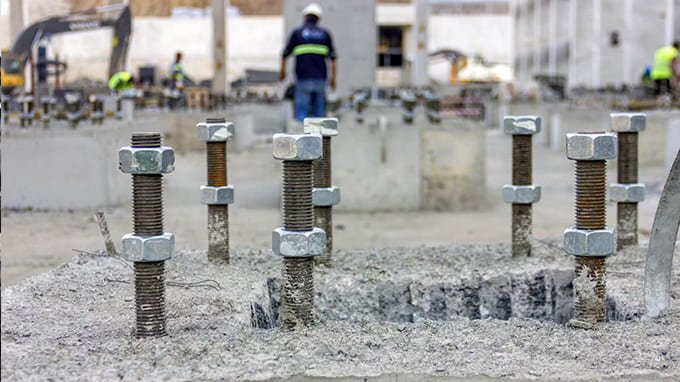In the world of construction and heavy machinery, foundation bolts (also called anchor bolts) play a vital role. They may seem simple, but as a trusted foundation bolt manufacturer and foundation bolt supplier, we understand that they are critical in keeping buildings and equipment securely attached to concrete foundations. Without these bolts, structures wouldn’t be able to stay in place. So, how do you choose the right foundation bolts for your project? This guide will explain the different types, materials, and uses of foundation bolts, helping you make an informed decision for your next project.
Foundation Bolts:
Foundation bolts, also known as anchor bolts, are threaded fasteners used to secure steel profiles, machinery, and other structural parts to concrete foundations. They come in different shapes, such as L-shaped, J-shaped, and straight, based on the specific needs of the project. These bolts are designed to provide stability and help maintain the overall structure’s integrity, making them essential for industries like construction, wind energy, and oil & gas.

In construction, concrete foundations are key to supporting the entire structure. Foundation bolts are what keep buildings and machinery securely attached to these foundations. They don’t just connect different parts; they ensure the structure stays in place under stress, like wind, earthquakes, or vibrations from heavy machinery. That’s why it’s important to pick the right foundation bolts for safety and stability.
Types of Foundation Bolts: Which One Do You Need?
There are many types of foundation bolts, and each has a specific use. The right choice will ensure the safety and stability of your project. Here are the most common types:

- L-shaped Bolts: These bolts are commonly used to anchor steel beams and columns to concrete. The L-shape increases the contact area with the concrete, making the bolt stronger and more stable.
- J-shaped Bolts: J-bolts are often used to secure walls or other structures to concrete foundations. The hook design helps keep things tightly fixed and prevents movement.
- Straight Bolts: These are simple bolts that go straight into concrete. They are used in situations where a simple and reliable fastening solution is needed.
- Welded Anchor Bolts: These bolts are welded to plates or other components, providing extra strength. They are commonly used in heavy-duty applications.
- Swedge Bolts: These bolts have a special design that allows them to grip the concrete better, making them perfect for heavy structures.
- Plate Bolts: Shaped like a “T”, plate bolts are used to hold heavy equipment or structures. Their larger surface area helps distribute the load more evenly.
How Do You Install Foundation Bolts?
Installing foundation bolts correctly is crucial for the stability of the entire structure. The installation process usually follows these steps:

- Mark the Spot: First, you need to mark where the bolts will go, usually before pouring the concrete.
- Insert the Bolts: Place the bolts into their designated spots, ensuring they are kept straight and stable.
- Tighten and Secure: Use nuts and washers to secure the bolts tightly. This step ensures they can handle the weight and pressure placed on them.
- Pour the Concrete: Once everything is in place, pour the concrete around the bolts, embedding them firmly.
After installation, it’s important to check that all the bolts are properly secured. This helps prevent them from loosening or shifting over time.
What Materials Are Foundation Bolts Made Of?
The material of the foundation bolts is important for their strength and performance. Common materials include:
- Carbon Steel: This is the most commonly used material, suitable for most standard applications. It’s strong, durable, and cost-effective.
- Stainless Steel: Ideal for environments that are exposed to moisture or chemicals, such as in marine or chemical plants. Stainless steel bolts are corrosion-resistant.
- Alloy Steel: Used for high-strength applications, especially in heavy machinery and large construction projects. Alloy steel offers extra strength and durability.
Choosing the right material based on your project’s needs will ensure that the foundation bolts last longer and perform well.
What is the Difference Between a Foundation Bolt and an Anchor Bolt?
While “foundation bolt” and “anchor bolt” are often used interchangeably, there are small differences:
- Foundation Bolts: These are typically used in construction and heavy machinery projects, specifically to anchor steel structures and equipment to concrete foundations.
- Anchor Bolts: This is a broader term that refers to any bolts used to secure something to a foundation, including foundation bolts, wall bolts, etc. So, all foundation bolts are anchor bolts, but not all anchor bolts are foundation bolts.
Knowing the difference helps in choosing the correct type for your project.
Where Are Foundation Bolts Used?
Foundation bolts are used in many industries where structures need to be securely attached to concrete. Common applications include:

- Construction Projects: In large buildings, bridges, and other structures, foundation bolts secure steel parts to the concrete.
- Heavy Machinery: Foundation bolts hold heavy machines like compressors and generators in place to prevent movement.
- Wind Energy: The towers of wind turbines are anchored to the ground with foundation bolts, making them stable and secure.
- Oil & Gas: Foundation bolts are used to secure equipment on oil rigs and refineries, ensuring safety and stability in these critical areas.
Conclusion
In conclusion, foundation bolts are essential for keeping structures and machinery securely attached to their concrete foundations. Whether you’re in construction, manufacturing, or the energy sector, choosing the right type and material is key to long-term stability. As a trusted foundation bolt manufacturer and foundation bolt supplier, we understand the importance of high-quality fasteners and are committed to delivering products that meet the highest standards. If you have more questions, feel free to contact us – we’re happy to help!
Contact Hengrui Fastener for Custom foundation bolts
For specialized applications that require custom solutions, Hengrui Fastener offers high-quality, customizable foundation bolts and fasteners. Whether you need a specific size, material, or finish, Hengrui can provide tailored fasteners to meet your exact requirements. Contact Hengrui Fastener to learn more about our products and services.






